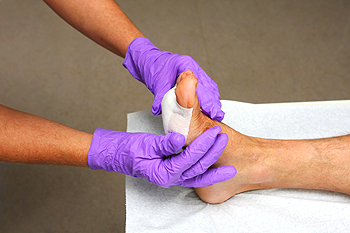Richfield (435) 896-6497
Ephraim (435) 283-4076
Recognition and Treatment of Infected Foot Wounds
Tuesday, 27 August 2024 00:00 Recognizing an infected foot wound is essential for prompt treatment and prevention of serious complications. Signs of infection include increased redness, swelling, warmth around the wound, and persistent pain. The wound may also produce pus or an unpleasant odor, and systemic symptoms such as fever or chills can occur. Immediate treatment involves thoroughly cleaning the wound with mild soap and water. Applying an antiseptic solution helps reduce bacterial load. Cover the wound with a sterile bandage and change it daily or as needed to keep it clean and dry. Mild pain relievers can help manage discomfort. Individuals with diabetes or compromised immune systems should be particularly vigilant, as they are at higher risk for complications. Early intervention and proper care are key to effectively treating an infected foot wound and promoting healing. If you have a foot wound and it appears infected or does not heal properly, it is strongly suggested that you schedule an appointment with a podiatrist as soon as possible for antibiotics or advanced wound care techniques.
Recognizing an infected foot wound is essential for prompt treatment and prevention of serious complications. Signs of infection include increased redness, swelling, warmth around the wound, and persistent pain. The wound may also produce pus or an unpleasant odor, and systemic symptoms such as fever or chills can occur. Immediate treatment involves thoroughly cleaning the wound with mild soap and water. Applying an antiseptic solution helps reduce bacterial load. Cover the wound with a sterile bandage and change it daily or as needed to keep it clean and dry. Mild pain relievers can help manage discomfort. Individuals with diabetes or compromised immune systems should be particularly vigilant, as they are at higher risk for complications. Early intervention and proper care are key to effectively treating an infected foot wound and promoting healing. If you have a foot wound and it appears infected or does not heal properly, it is strongly suggested that you schedule an appointment with a podiatrist as soon as possible for antibiotics or advanced wound care techniques.
Wound care is an important part in dealing with diabetes. If you have diabetes and a foot wound or would like more information about wound care for diabetics, consult with Dr. Blake Zobell from Utah. Our doctor will assess your condition and provide you with quality foot and ankle treatment.
What Is Wound Care?
Wound care is the practice of taking proper care of a wound. This can range from the smallest to the largest of wounds. While everyone can benefit from proper wound care, it is much more important for diabetics. Diabetics often suffer from poor blood circulation which causes wounds to heal much slower than they would in a non-diabetic.
What Is the Importance of Wound Care?
While it may not seem apparent with small ulcers on the foot, for diabetics, any size ulcer can become infected. Diabetics often also suffer from neuropathy, or nerve loss. This means they might not even feel when they have an ulcer on their foot. If the wound becomes severely infected, amputation may be necessary. Therefore, it is of the upmost importance to properly care for any and all foot wounds.
How to Care for Wounds
The best way to care for foot wounds is to prevent them. For diabetics, this means daily inspections of the feet for any signs of abnormalities or ulcers. It is also recommended to see a podiatrist several times a year for a foot inspection. If you do have an ulcer, run the wound under water to clear dirt from the wound; then apply antibiotic ointment to the wound and cover with a bandage. Bandages should be changed daily and keeping pressure off the wound is smart. It is advised to see a podiatrist, who can keep an eye on it.
If you have any questions, please feel free to contact one of our offices located in Richfield and Ephraim, Utah . We offer the newest diagnostic and treatment technologies for all your foot care needs.








